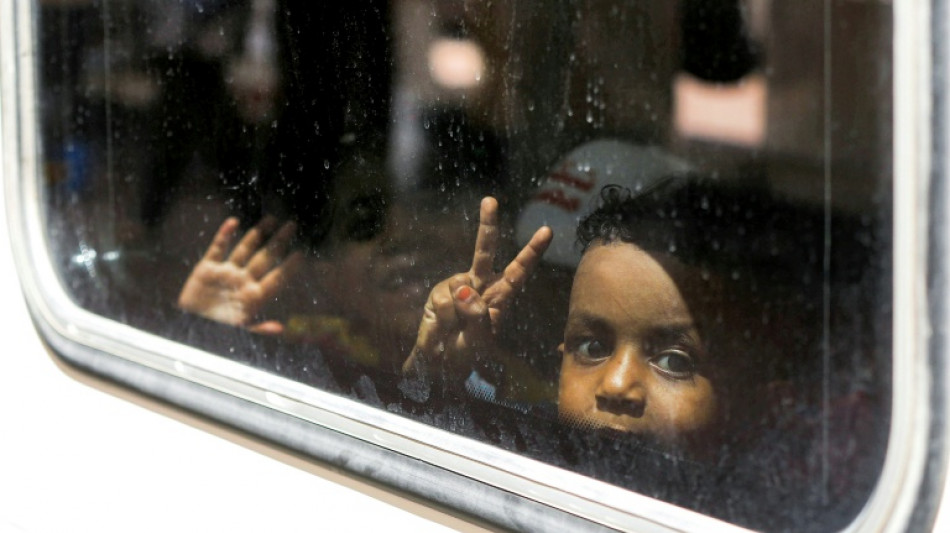On a sweltering Monday morning at Cairo's main railway station, hundreds of Sudanese families stood waiting, with bags piled at their feet and children in tow, to board a train bound for a homeland shattered by two years of war.
The war is not yet over, but with the army having regained control of key areas and life in Egypt often hard, many refugees have decided now is the time to head home.
"It's an indescribable feeling," said Khadija Mohamed Ali, 45, seated inside one of the train's ageing carriages, her five daughters lined beside her.
"I'm happy that I'll see my neighbours again -- my family, my street," she told AFP ahead of her return to the capital Khartoum, still reeling from a conflict that has killed tens of thousands and displaced more than 14 million.
She was among the second group of refugees travelling under Egypt's voluntary return programme, which offers free transportation from Cairo to Khartoum, more than 2,000 kilometres away by train and bus.
The first convoy left a week earlier.
The programme is a joint effort between the Egyptian National Railways and Sudan's state-owned arms company Defence Industries System, which is covering the full cost of the journey, including tickets and onward bus travel from Egypt's southern city of Aswan to the Sudanese capital.
The Sudanese army is keen for the refugees to return, in part to reinforce its control over recently recaptured areas and as a step towards normality.
Each Monday, a third-class, air-conditioned train departs Cairo carrying hundreds on a 12-hour journey to Aswan before they continue by bus across the border.
At precisely 11:30 am, a battered locomotive rumbled into the station and women broke into spontaneous ululation.
But while some Sudanese are returning home, many continue to flee their homeland, which has been ravaged by war and famine.
According to a June report from the UN's refugee agency UNHCR, over 65,000 Sudanese crossed into Chad in just over a month.
Crossings through Libya, one of the most dangerous routes to Europe, have increased this year, according to the Mixed Migration Center.
- Khartoum retaken -
The war, which began in April 2023, pits army chief Abdel Fattah al-Burhan against his erstwhile ally Mohamed Hamdan Daglo, who leads the paramilitary Rapid Support Forces (RSF).
The fighting first erupted in Khartoum and quickly spread, triggering one of the world's worst humanitarian crises, according to the United Nations.
Earlier this year, Sudan's army declared it had fully retaken Khartoum. Since then, a trickle of returnees has begun.
Last week, the country's new prime minister, Kamil Idris, made his first visit to the capital since the conflict began, promising that "national institutions will come back stronger than before".
The UN has predicted that more than two million people could return to greater Khartoum by the end of the year, though that figure depends heavily on improvements in security and public infrastructure.
The capital remains a fractured city. Its infrastructure has been decimated, health services remain scarce and electricity is still largely out in many districts.
- 'Just go back' -
"Slowly things will become better," said Maryam Ahmed Mohamed, 52, who plans to return to her home in Khartoum's twin city of Omdurman with her two daughters.
"At least we'll be back at home and with our family and friends," she told AFP.
For many, the decision to return home is driven less by hope than by hardship in neighbouring countries like Egypt.
Egypt now hosts an estimated 1.5 million Sudanese refugees, who have limited access to legal work, healthcare and education, according to the UNHCR.
Hayam Mohamed, 34, fled Khartoum's Soba district with her family to Egypt 10 months ago when the area was liberated, but was in ruins.
Though services remain nearly non-existent in Khartoum, Mohamed said she still wanted to leave Egypt and go home.
"Life was too expensive here. I couldn't afford rent or school fees," Mohamed said.
Elham Khalafallah, a mother of three who spent seven months in Egypt, also said she struggled to cope.
She's now returning to the central Al-Jazirah state, which was retaken by the army late last year and is seen as "much safer and having better services than Khartoum".
According to the UN's International Organization for Migration, about 71 percent of returnees were heading to Al-Jazirah, southeast of the capital, while fewer than 10 percent were going to Khartoum.
Just outside the Cairo station, dozens more were sitting on benches, hoping for standby tickets.
"They told me the train was full," said Maryam Abdullah, 32, who left Sudan two years ago with her six children.
"But I'll wait. I just want to go back, rebuild my house, and send my children back to school," she told AFP.
E.Willems--LCdB
